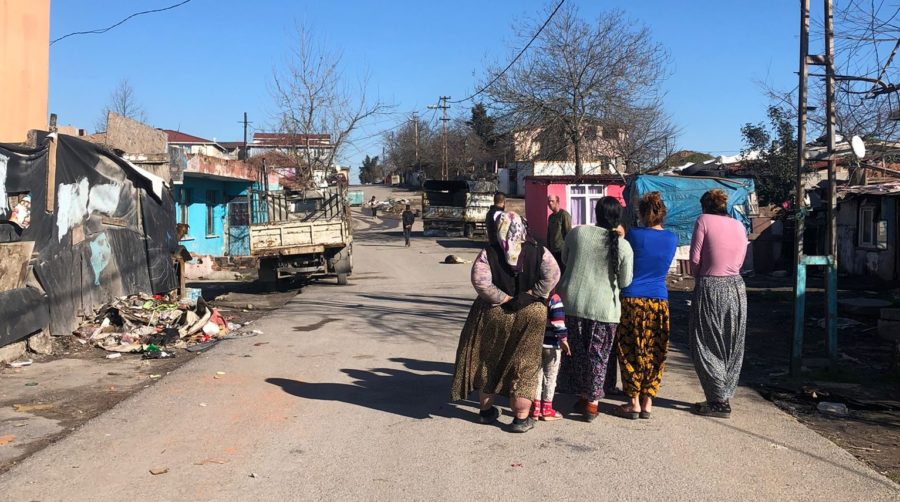
[vc_row][vc_column][vc_column_text]Our Deep Poverty Action Fund was launched in May 2021 to address deep poverty and widening inequalities in Türkiye, which significantly worsened since the start of the COVID-19 pandemic. The fund supported the Mobile Food Bank project between July 2021 – February 2023, a joint initiative of Turkey Mozaik Foundation’s two previous grantees, the Deep Poverty Network and the Basic Needs Association.
The Deep Poverty Network (Derin Yoksulluk Ağı – DYA) is an initiative of the Open Space Association, established in March 2020 to combat extreme poverty. Since the beginning of the pandemic, DYA has been working on disadvantaged families’ access to basic needs, such as food, hygiene materials and baby supplies. These needs were determined in field visits and shared with the donors who supplied them via the e-commerce sites of the markets and sent directly to the families without any intermediaries. DYA has been working to increase the impact of this unique model and conducting research and advocacy activities to combat poverty.
Basic Needs Association (Temel İhtiyaç Derneği – TİDER) works to ensure that all people can meet their basic needs in a fair and equal manner and uses the food banking model as a crucial tool in combating hunger, poverty, and waste prevention. TİDER provides a sustainable model in the fight against poverty, not only by helping disadvantaged people through their food banks called “Support Markets”, but also by supporting their employability and providing opportunities through their Support HR system.
Project summary: The Mobile Food Bank project aimed to extend monthly food and hygiene assistance to families living in deep poverty in Istanbul. These beneficiaries were identified by DYA among families residing below the hunger threshold, grappling with pandemic-induced income limitations, lacking social security coverage, and facing barriers to accessing government aid.
Project achievements
With this grant support, a van was purchased by TİDER, which was converted to serve as a mobile food bank and utilised for the trips to the neighbourhoods for distribution. DYA efficiently coordinated the distribution process, managing address information and distribution routes for all deliveries.
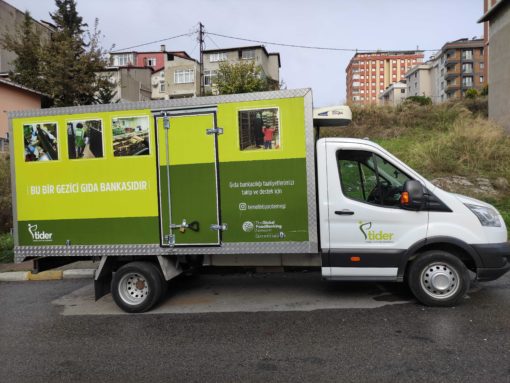
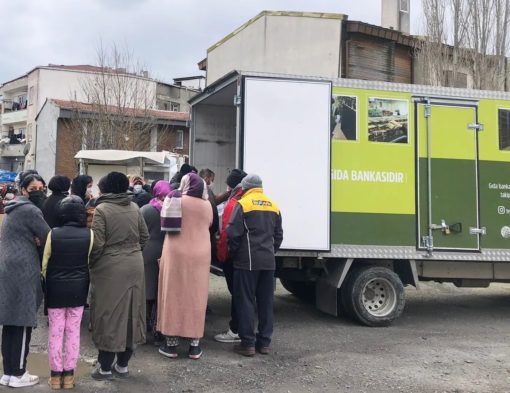
1,360 packages filled with essential food, vital hygiene products, and clothing were delivered to families living in deep poverty in the Çekmeköy, Karagümrük, andSancaktepe neighbourhoods of Istanbul over eight months. These packages were prepared from products saved by TİDER from going to waste and through collaborations with various corporate donors and civil society organisations. The packages included 17 different types of products, including clothing items, hygiene products, and food. Additionally, 500 bags of stationery items were distributed to support children’s education.
In total, 174,387 kilograms of products, with a total cost of TRY 1,038,674,816,750, were distributed to the beneficiaries, and the project vehicle travelled a total distance of 14,950 kilometres.
Collaborations for wider impact: DYA established collaborations with multiple other stakeholders for additional support, including the distribution of 1,000 food packages, donated during Ramadan, and the provision of 10,100 free meals to primary school students through collaborations with TOKTUT. Further collaborations were formed with Boyner for clothing, and with Beije and Rotary for sanitary products, and distributions were carried out effectively.
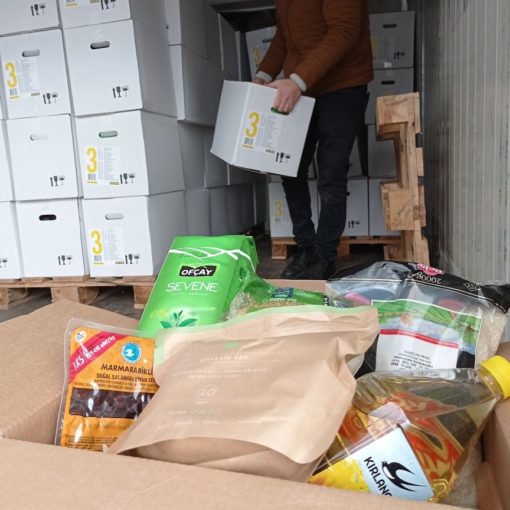
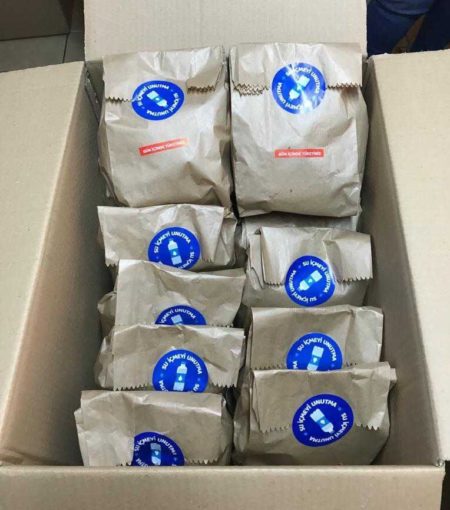
Social services and support: One of the primary pillars of the project was to identify the educational, employment, and healthcare needs of these families, disseminate information regarding available social services, and offer guidance. For this purpose, DYA conducted interviews with one adult from 380 households to assess needs, and risks, and record the obtained information in a database. A total of 116 households were identified as high-risk during this assessment. To mitigate identified risks and ensure beneficiaries’ access to social rights, consultations were held, involving the beneficiaries in all planning and decision-making processes.
The social service component of the project advanced in the first six months with introductions, preliminary interviews, and information sharing. Field visits were conducted by DYA to assess the needs on the ground. In the subsequent six months, focused efforts were made for households with identified sensitive situations through visits and close monitoring of households.
Referrals were made to the Istanbul Metropolitan Municipality, as well as districtSocial Service Centres (Sosyal Hizmet Merkezi) affiliated with the Ministry of Family and Social Services, and Social Aid and Solidarity Foundations (Sosyal Yardımlaşma ve Dayanışma Vakfı – SYDV) under district governorates. Information was provided regarding the Istanbul Metropolitan Municipality’s food cards, newborn kits, employment offices, and services for people with disabilities, resulting in 144 referrals that facilitated access to these services.
Information about disability care, disability allowances, and socioeconomic support was also provided, with 53 people referred to these mechanisms, of which 22 started to receive support. Information regarding the support available from district governorates/SYDVs for heating, coal, and cash support resulted in 54 referrals.
Impact of the Fund on the Grantee Organisations
Leveraging TIDER’s expertise in food banks and DYA’s experience in working with the most vulnerable communities, the families were directly contacted and provided with vital necessities on a monthly basis. With the assistance of social workers, these families were connected to existing local government and civil society support systems, aiming to help them break the cycle of deep poverty.
Collaborations and groundwork: Throughout the project, DYA regularly operated on the ground, enabling the identification of needs and gaining a deeper understanding of the challenges and requirements faced by those living in deep poverty. This groundwork laid a solid foundation for future initiatives, fostering collaborations to develop tailored solutions and interventions addressing the holistic needs of these communities.
An impactful collaboration was formed with the Needs Map (İhtiyaç Haritası), resulting in the development of a database to track DYA’s records and support systems. This database not only contains basic beneficiary information but also data on their access to rights and support mechanisms. This enables DYA to conduct monitoring, thereby strengthening the network’s advocacy aspect. Out of the 679 households registered in the database, 404 households were tracked and monitored under this project.
In addition to TİDER’s distributions, DYA provided regular food support to households through online digital codes. Collaborations with Momento and Verimor applications and operator services facilitated the rapid distribution of digital shopping codes for clothing items and food to a large number of households through the DYA database.
A partnership was initiated with Özyeğin University’s Faculty of Law, involving senior law students working with mentor lawyers to prepare information notes, hold workshops, and provide tailored legal counselling in response to the emerging needs in the field.
The collaboration with TOKTUT and Nişantepe Elementary School, along with the pilot free meal support, paved the way for future activities in primary schools. A sustainable work plan was developed to enhance the school’s capacity, involving other civil society organisations working on children’s rights.
Through these collaborations, DYA observed that empowerment activities targeting residents in a neighbourhood are most effective when residents, and related institutions such as schools, support mechanisms, universities, and other civil society organisations actively participate.
Organisational development: The introduction of a mobile food bank vehicle solved logistical problems and increased TİDER’s capacity to receive and distribute donations quickly, often on the same day. This strategy saved more products from going to waste and reached a larger number of people in need. Collaboration with DYA enabled TİDER to reach a specific target group – people living in deep poverty who were unable to access the food banking system through traditional social services.
The Mobile Food Bank brought aid directly to the beneficiaries, eliminating the need for them to leave their neighbourhoods, spend money on transportation, or visit various institutions to receive support.
Throughout the project, these collaborations and experiences have been instrumental in fostering a learning process for DYA. To ensure the rights of beneficiaries and partner organisations are protected, DYA crafted a ‘Collaboration Principles Commitment.’ Additionally, to prioritise the well-being of children during fieldwork management, a “Child Safety Policy” was developed.
Please stay tuned for updates on the projects of our grantees, and subscribe to our newsletter. Thank you for your support.
[/vc_column_text][/vc_column][/vc_row]



